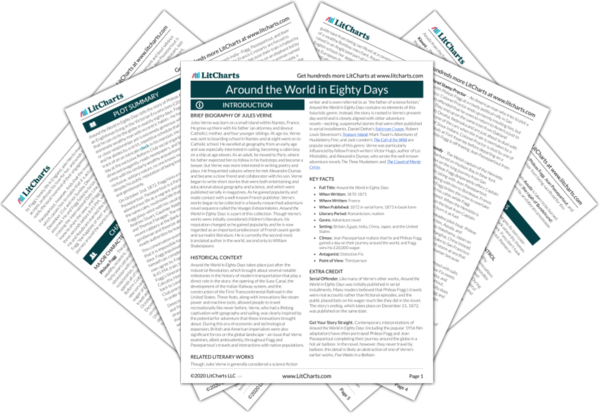Mr. Fogg played, not to win, but for the sake of playing. The game was in his eyes a contest, a struggle with a difficulty, yet a motionless, unwearying struggle, congenial to his tastes.

Unlock explanations and citation info for this and every other Around the World in Eighty Days quote.
Plus so much more...
Get LitCharts A+Phileas Fogg was not known to have either wife or children, which may happen to the most honest people; either relative or near friends, which is certainly more unusual. He lived alone in his house in Saville Row, whither none penetrated…He breakfasted and dined at the club, at hours mathematically fixed, in the same room, at the same table, never taking his meals with other members, much less bringing a guest with him; and went home at exactly midnight, only to retire at once to bed.

“Ah, we shall get on together, Mr. Fogg and I! What a domestic and regular gentleman! A real machine; well, I don’t mind serving a machine.”
“The world has grown smaller, since a man can now go round it ten times more quickly than a hundred years ago. And that is why the search for this thief will be more likely to succeed.”
“I see how it is,” said Fix. “You have kept London time, which is two hours behind that of Suez. You ought to regulate your watch at noon in each country.”
“I regulate my watch? Never!”
“Well then, it will agree with the sun.”
“So much the worse for the sun, monsieur. The sun will be wrong, then!”
“Very curious, very curious,” said Passepartout to himself, on returning to the steamer. “I see that it is by no means useless to travel, if a man wants to see something new.”
But Phileas Fogg, who was not travelling, but only describing a circumference, took no pains to inquire into these subjects; he was a solid body, traversing an orbit around the terrestrial globe, according to the laws of rational mechanics.
Passepartout, on waking and looking out, could not realize that he was actually crossing India on a railway train. The locomotive, guided by an English engineer and fed with English coal, threw out its smoke upon cotton, coffee, nutmeg, clove, and pepper plantation, while the steam curled in spiral around groups of palm-trees, in the midst of which were seen picturesque bungalows, viharis (sort of abandoned monasteries), and marvelous temples enriched by the exhaustless ornamentation of Indian architecture.
“Suppose we save this woman.”
“Save the woman, Mr. Fogg!”
“I have yet twelve hours to spare; I can devote them to that.”
“Why, you are a man of heart!”
“Sometimes,” replied Phileas Fogg, quietly; “when I have the time.”
As for Passepartout, he was ready for anything that might be proposed. His master’s idea charmed him; he perceived a heart, a soul, under that icy exterior. He began to love Phileas Fogg.
“The chance which now seems lost may present itself at the last moment.”
What would these divinities think of India, anglicized as it is to-day, with steamers whistling and scudding along the Ganges, frightening the gulls which float upon its surface, the turtles swarming along its banks, and the faithful dwelling along its borders?
Passepartout wandered, with his hands in his pockets, towards the Victoria port, gazing as he went at the curious palanquins and other modes of conveyance, and the groups of Chinese, Japanese, and Europeans who passed to and fro in the streets. Hong Kong seemed to him not unlike Bombay, Calcutta, and Singapore, since, like them, it betrayed everywhere the evidence of English supremacy.
“Mr. Fix,” he stammered, “even should what you say be true—if my master is really the robber you are searching for—which I deny—I have been, am, in his service; I have seen his generosity and goodness; and I will never betray him—not for all the gold in the world. I come from a village where they don’t eat that kind of bread!”
Here, as at Hong Kong and Calcutta, were mixed crowds of all races, Americans and English, Chinamen and Dutchmen, mostly merchants ready to buy or sell anything. The Frenchman felt himself as much along among them as if he had dropped down in the midst of Hottentots.
Aouda returned to a waiting-room, and there she waited alone, thinking of the simple and noble generosity, the tranquil courage of Phileas Fogg. He had sacrificed his fortune, and was now risking his life, all without hesitation, from duty, in silence.
Phileas Fogg did not betray the last disappointment; but the situation was a grave one. It was not at New York as at Hong Kong, nor with the captain of the Henrietta as with the captain of the Tankadere. Up to this time money had smoothed away every obstacle. Now money failed.
“I pity you, then, Mr. Fogg, for solitude is a sad thing, with no heart to which to confide your griefs. They say, though, that misery itself, shared by two sympathetic souls, may be borne with patience.”
Phileas Fogg had won his wager, and had made his journey around the world in eighty days. To do this he had employed every means of conveyance—steamers, railways, carriages, yachts, trading vessels, sledges, elephants. The eccentric gentleman had throughout displayed all his marvelous qualities of coolness and exactitude. But what then? What had he really gained by all this trouble? What had he brought back from this long and weary journey?
Nothing, say you? Perhaps so; nothing but a charming woman, who, strange as it may appear, made him the happiest of men!
Truly, would you not for less than that make the tour around the world?











